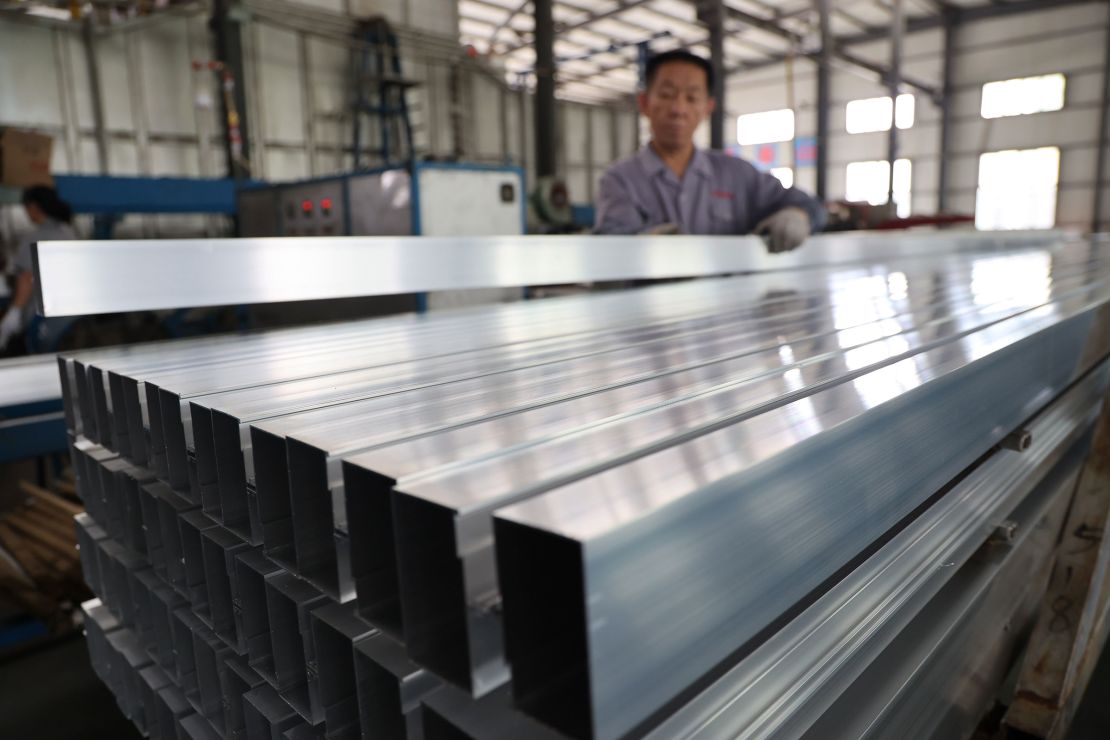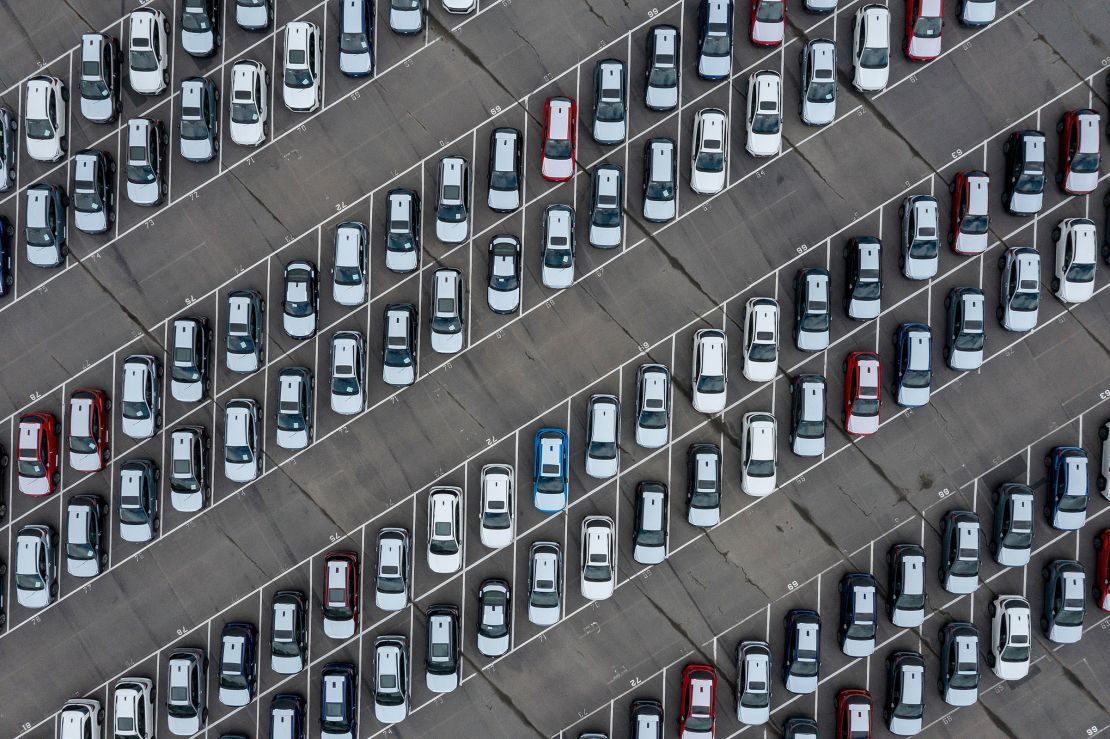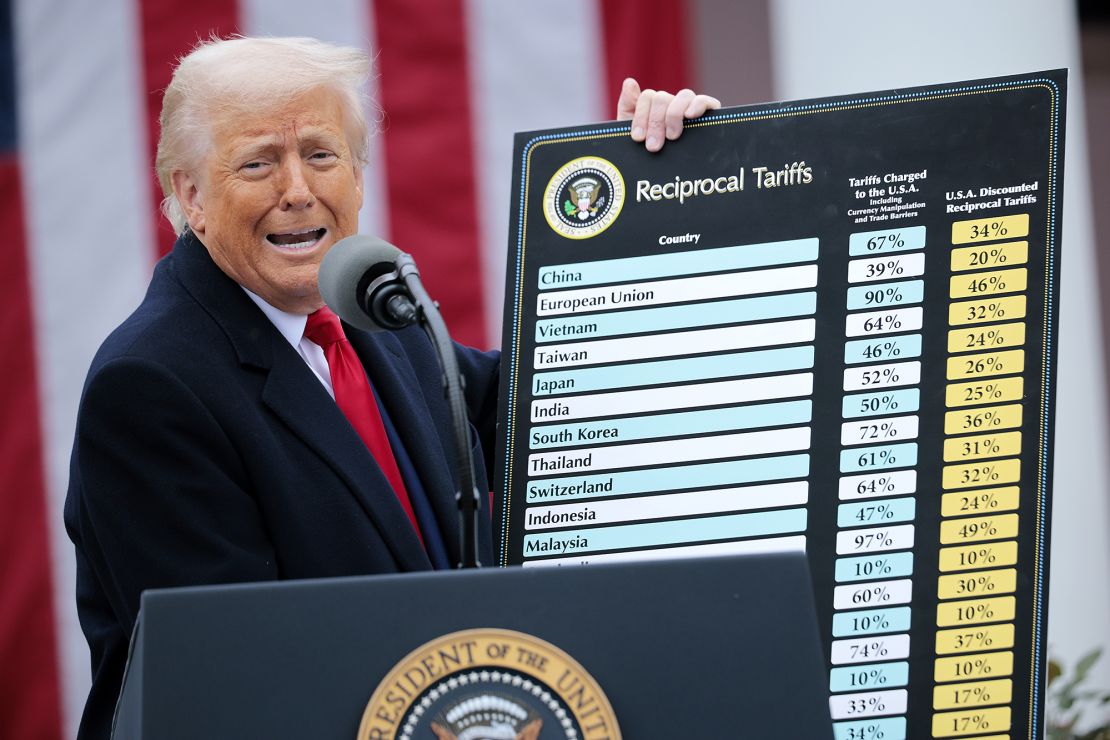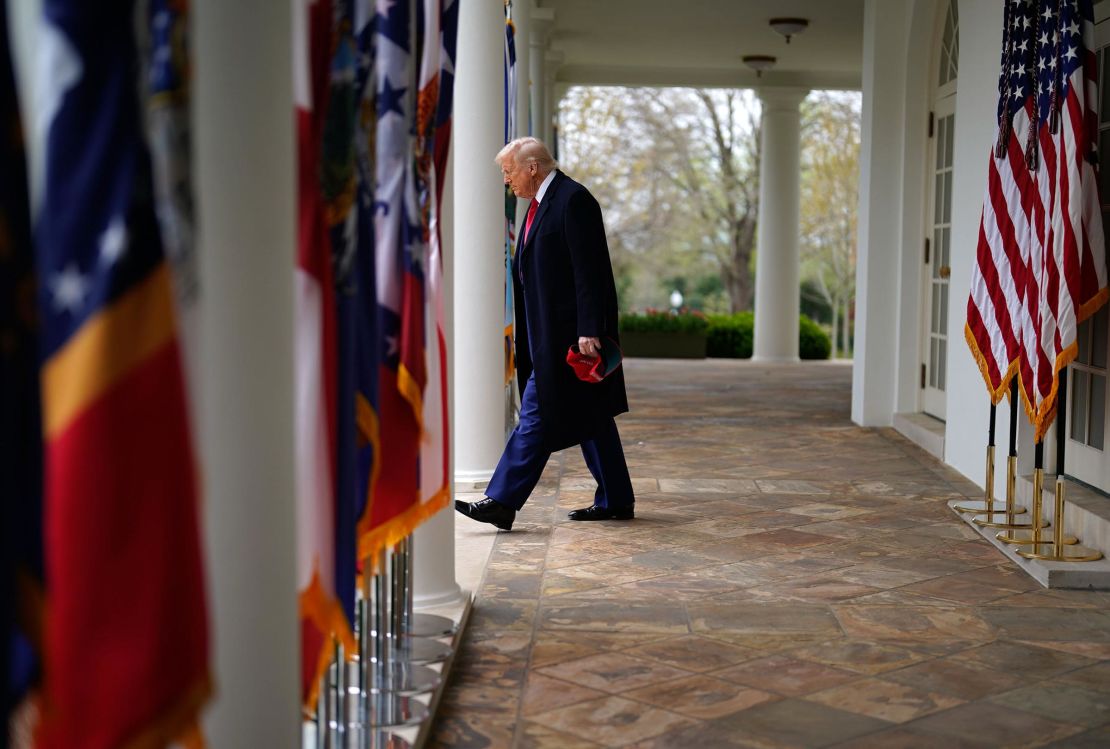Editor’s Note: President Donald Trump’s massive wager on tariffs with your money came together over years. It took just days to fall apart. This is Part 4 of an in-depth, contemporaneous look at the first 100 days of Trump’s second term.
CNN
—
When the stock market started chewing through retirement accounts like a wheat thresher, business owners began howling about the risk of ruination, and economic analysts commenced clanging warning bells of a possible worldwide recession, many political watchers thought surely President Donald Trump would take notice. They were certain he would finally see the existential danger of slapping punishing tariffs on scores of countries and step back from his potentially catastrophic plan.
Instead, in the 10th week of his new term, the 47th president is leaning into his latest favorite metaphor: that international trade is a high-stakes card game and he is the master strategist. Only he knows which countries hold a strong hand, which do not, and how bets should be placed. And he is laying down a massive wager.
“For decades our country has been looted, pillaged, raped and plundered by nations near and far, both friend and foe alike,” he proclaims to an adoring crowd of Republican VIPs. They have assembled at the White House to celebrate what he calls his “Liberation Day” tariffs. Up at the podium, Trump gleefully displays a chart thick with numbers purporting to show just how much each country will pony up for access to the great American marketplace.
But experts who have played the trade game much longer quickly call Trump’s big move on the second day of April a fool’s bet — one that could poison US trade relations with those friendly partners he mentioned and open the door for less friendly competitors to capitalize on his misstep. Skeptics say Trump is flirting with the kind of failure that can unwind a presidency.
Trump meets their warnings with a jutted jaw and declarations that he will not blink.
To understand how Trump came so quickly to such a perilous spot after much talk, many threats and occasional applications of tariffs in much smaller degrees, it’s worth considering what those close to him have said for years. He truly believes the ability to tax imported goods is a near-mythical power to wipe away trade deficits, stop illegal immigration, control trafficking in illicit drugs, and make the world bow to his will. Aside from military force, he seems to see tariffs as the most direct way a president can rule over not just the United States, but everyone, everywhere.
“I always say ‘tariffs’ is the most beautiful word to me in the dictionary,” he said back on Inauguration Day just as he had on the campaign trail, “because tariffs are going to make us rich as hell. It’s going to bring our country’s businesses back that left us.”
It’s an intriguing claim considering how little good came out of his initial tilt with tariffs. Over the four years of Trump’s first term, he and Chinese President Xi Jinping took turns levying tariffs on pork, solar panels, steel pipes, fruit, nuts, intellectual property, recycled aluminum and more. They eventually worked out an agreement, satisfying Trump’s need to declare himself the master negotiator. But subsequent studies found the promise he extracted for China to buy an additional $200 billion in US goods and services went almost entirely unfulfilled. President Joe Biden maintained those tariffs, but as a practical matter, Trump’s first trade war ended in a draw.

Still, this time around Team Trump insists it is making a bigger, longer play. By squeezing world markets simultaneously, the US will drive other countries away from their protectionist tendencies. Better trade balances will follow. Jobs that once moved away from America to find cheaper labor will come back to avoid higher import fees. Gleaming new factories will spring up like wildflowers. Trump will triumph.
“Remember the armies of millions of millions of human beings screwing in little, little screws to make iPhones? That kind of thing is going to come to America!” Secretary of Commerce Howard Lutnick says on CBS’ “Face the Nation,” raising the specter of factories full of laborers as a grand vision for the future. But then Lutnick clarifies: Any modern factories will undoubtedly include massive amounts of automation. He’s talking about other, better jobs for the people he says will benefit from Trump’s big tariff gamble. “High school-educated Americans, the core to our workforce, is going to have the greatest resurgence of jobs in the history of America to work on these high-tech factories.”
For many economists, labor analysts and technology specialists, it is a laughably far-fetched idea. Even if tariffs can offset some of the lower wages elsewhere, big investments in big properties — such as manufacturing plants — take years, even if investors are fully confident in the political stability of the host nation.
What’s more, in the wake of the Covid-19 pandemic, Biden had already boosted American manufacturing jobs to higher levels than Trump ever saw in his first term. Indeed, 20% of domestic factories that are underproducing say a shortage of workers is to blame. By 2033, some researchers say more than half of all new manufacturing jobs in the US could be unfilled.
CNN’s Matt Egan, one of the most astute economic reporters around, spoke to a former Ford executive and came away with a cautionary tale. Even that giant of American auto production “had trouble finding qualified workers to work in their assembly plants,” Egan says. And some of those they did find? “They ended up quitting because they didn’t realize just how difficult the job would be.”
In a broad sense, Trump is right to say many of America’s once-thriving, old-fashioned factory towns descended into dust and decay in part because other countries used tariffs to protect their manufacturing industries. Some statistics show that most of America’s big trading partners have higher import fees, making US goods more costly and putting US exporters at a disadvantage. But there is precious little evidence to support Trump’s notion that America’s future economic glory will come from pushing its citizens back to assembly lines that, based on his descriptions, often sound like the kind of heavy production of the post-World War II years.
And make no mistake: Despite everything Trump says, foreign nations will not pay all these tariffs. Instead, economic analysts overwhelmingly say American consumers will foot most of the monumental bill for what those experts call Trump’s taxes.
Perhaps it should be no surprise then, that within days of Trump’s “Liberation” event, even nominal friends who supported him in the election are skimming wild cards toward the president’s carefully stacked tariff deck.
“We’ve got to become friends with Canada again,” Joe Rogan says on one of the most popular podcasts in the world with millions of listeners per episode. “I can’t believe that there is anti-American and anti-Canadian sentiment going on. This is the dumbest f**king feud.”
“The idea that this is good and makes the American economy inherently stronger is wrongheaded,” conservative commentator Ben Shapiro says to his own vast audience. “Trump’s reciprocal tariffs impose hundreds of billions of dollars in new taxes on Americans without public or congressional input.”
Estimates start appearing in the news about cars costing thousands of dollars more; the price of televisions, bananas, clothing, computers and sporting goods skyrocketing. Considering that voters’ anger over inflation helped propel Trump back to the White House, the idea that he would risk driving prices into the stratosphere with such a big, early move is alarming to even some GOP lawmakers.

“High prices are obviously something no one wants to pay — I understand the concern they have,” Rep. Mike Lawler, a New York Republican, tells CNN while nodding to the hope that other countries might cave to Trump’s demands before the worst hits the home front.
On the Democratic side, Rep. Morgan McGarvey of Kentucky says the damage is already being done by Trump’s weeks of threatening tariffs, imposing them, then pausing them. “It’s the uncertainty,” McGarvey says. “It’s the on-again, off-again, on-again, off-again. … Our phones are ringing off the hook right now. People see their 401(k)s, they see their college funds for their kids just cratering.”
CNN’s Jamie Gangel sees lawmakers of all stripes looking at the days and weeks ahead and quaking. “They don’t know what Donald Trump is going to wake up and decide.”
The Yale Budget Lab says Trump’s tariffs will raise costs for the average American family by $3,800 annually. Some analysts picking apart how the administration calculated those retaliatory tariff rates noted the tariff formula released by the White House seemed to bear a strong resemblance to a formula generated by ChatGPT. As if to underscore the administration’s seemingly slapdash approach, the Trump plan is found to include a 10% tariff on some Antarctic islands where there are no people. Only penguins.
Billionaire hedge fund manager Bill Ackman, who backed Trump in the election, posts his concerns online. “By placing massive and disproportionate tariffs on our friends and enemies alike and thereby launching a global economic war,” Ackman writes, “we are in the process of destroying confidence in our country.”
The metric for fear on Wall Street (there really is such a thing) is pegging at levels not seen since Covid-19 shattered global supply chains. The stock market is splashing red across newscasts, showing $6 trillion in lost value over a week. Respected financial institutions are putting the odds of a recession well above 50%.
Even Elon Musk takes an apparent swing at Trump’s call for a 20% tariff on Europe. The richest man in the world — and a top adviser to the president — tells a right-wing political conference in Italy he’d like to see a “zero tax situation … a free trade zone between Europe and North America.”
A chief architect and defender of Trump’s tariff policy, Peter Navarro, suggests Musk is trying to protect his electric car business. The Tesla CEO calls Navarro a “moron … dumber than a sack of bricks.” Musk will later apologize — to bricks.
“THIS IS AN ECONOMIC REVOLUTION, AND WE WILL WIN,” the president posts on Truth Social, pushing for a rally. At a fundraiser for congressional Republicans, he insists the White House is being flooded with messages from abroad.
“I know what the hell I’m doing,” Trump says, implying that his refusal to give an inch is paying off, as Republican lawmakers keep praising his steel spine. “These countries are calling us up, kissing my a**. They are dying to make a deal,” the leader of the free world says as if he is about to lay his winning hand on the table
Less than 24 hours later, he folds.

The president imposes a 90-day suspension for many of the tariffs he had declared nonnegotiable. It happens so suddenly that US Trade Representative Jamieson Greer is testifying in a congressional hearing when he hears about the new strategy. Rep. Steven Horsford, a Democrat from Nevada, rips into the White House witness for claiming to know what was happening — and then seeming just as surprised as everyone else. “WTF! Who’s in charge?” Horsford shouts. “There is no strategy! This is amateur hour, and it needs to stop!”
Amid reports that an alarming shift in the bond market — a key pillar of US economic power — is what made Trump retreat, the president’s team insists he did not buckle at all. Although many were praising him hours earlier for refusing to budge on his tariff demands, they are now crowing about his wily genius. Treasury Secretary Scott Bessent says this was Trump’s “strategy all along.” Brilliant. The ultimate dealmaker. The praise is unending among Republicans, and the financial markets come surging back for their best day in 16 years.
Trump declares victory.
In the cold light of morning, reality returns. Commentators outside the MAGA echo sphere start saying all Trump did was push the world dangerously close to an economic disaster and then proclaim himself a hero for backing away from the calamity he created. The prediction of the Yale Budget Lab adjusts upward — now placing the annual tariff tax on families at $4,700. To make matters worse, some analysts say Trump’s brash bet substantially weakened the faith of other nations in the reliability of the US government.
“Biggest winner is China. Hands down.” On the “Pivot” podcast, which scrutinizes the intersection of business, tech and politics, entrepreneur and New York University professor of marketing Scott Galloway pulls no punches. “Every Chinese diplomat and businessman … they’re all working overtime and they’re going to European capitals; they’re going everywhere … and they are saying, ‘You may not agree with us, but you know what? We’re good partners.’”
Analysts note, through all the ups and downs, the financial markets have still not returned to Inauguration Day levels when all of Trump’s tariff talk was still theory. What’s more, a social media post from Trump saying “this is a great time to buy” a few hours before his about-face brings accusations of illegal insider trading, to which the White House accuses Democrats of playing “partisan games.”
In addition, when it becomes clear how many tariffs have not been suspended, and how China is now facing at least a whopping 145% fee to send goods into the US, the markets nosedive again.
China calls Trump’s policies a “joke,” strikes back with its own 125% tariff on US goods, and financial experts refuse to lower their predictions of a possible recession. Indeed, Larry Fink, the CEO of the gargantuan, global investment company BlackRock, says on CNBC in mid-April, “I think we are very close, if not in a recession now.”
Trump says he’s waiting on a call from China to discuss some sort of deal, and White House press secretary Karoline Leavitt says, “He wants consumers to trust in him, and they should trust in him.”

But it appears they don’t — at least not at the levels they did when voters put him back into office. A University of Michigan study, taken before the tariff uproar, is released and shows consumer sentiment at its second lowest level since 1952 with fears of inflation charging upward. Farmers go back to worrying about what will happen to overseas sales of their crops. Businesspeople return to fretting about rising costs and ebbing sales. Working families brace for it all to come crashing down on their bank accounts.
Less than one hundred days into his second turn at the presidency, Donald Trump has bet the lives and livelihoods of hundreds of millions of Americans on his deep affection for tariffs.
He has started the most significant trade war in generations.
It is not clear whether he can end it.
CNN’s Kaanita Iyer contributed to this report.
